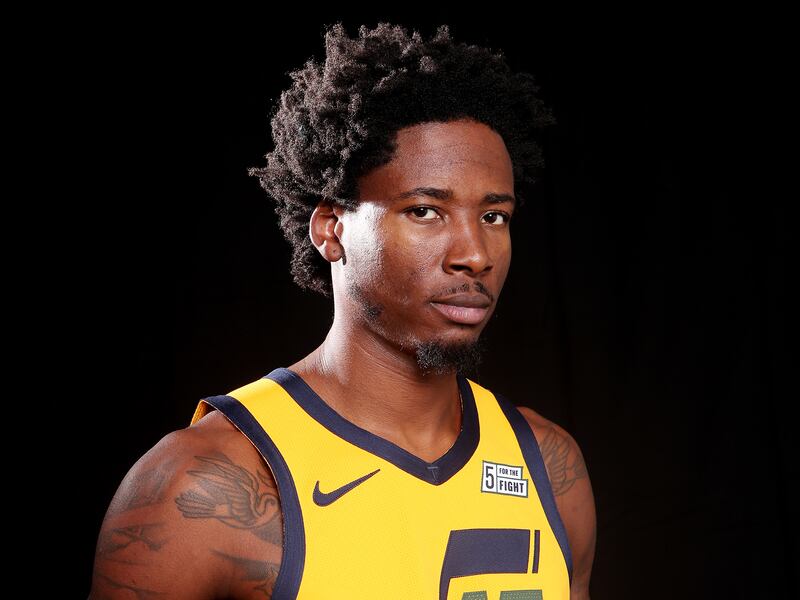SALT LAKE CITY — From the time Utah Jazz big man Ed Davis was a young boy growing up in Virginia, he knew he wanted to be an NBA player. Like so many other kids, he aspired to be like the players he saw on television and in online videos or whose images he saw on posters.
But unlike the vast majority of those children, he had a few advantages that would help him eventually make his dream a reality that started with his parents. First, there was the fact that his father, Terry Davis, played 10 years in the league, giving him an inside look at what life in the NBA was like. Secondly, his mother supported his dream wholeheartedly, allowing him to work at his craft on a daily basis since childhood. Not to mention the fact that he, himself, was totally committed to the notion of becoming a professional basketball player.
“I was all-in at a young age — like 8 or 9 years old. My whole life goal was to make it to the NBA,” he said. “I put basketball first before everything. My parents let me do that and it paid off.”
He said that besides having a father for a role model, he had a “hunger” for game that prompted him to put in work day after day even when his friends were having fun doing other things. That focus kept him “out of trouble” and allowed him to take the necessary steps to reach his full potential as an athlete.
“As soon as I came home from school, I was going outside to play (basketball) or going to the nearest gym,” Davis explained. “I put a lot of work in and a lot of time ... before school and after school — all those little things and it paid off.”
As a star at Benedictine High in Richmond, Virginia, Davis won two state championships and was named Mr. Basketball in 2008 and rated as a McDonald’s high school all-American. He went on to play at North Carolina where he helped the Tar Heels win the national championship in 2009 and went on to be a lottery pick in the 2010 NBA collegiate draft.
He attributes much of his success to the “God-given” talent and height he possessed, along with the unwavering desire to reach his goal. Today, as a tenured veteran player playing for his sixth team, he recalls how extremely challenging carving our a career in a highly competitive league like the NBA can be.
“(On one team) I had a coach that didn’t like me from day one, so that made it tough on me and slowed down my career,” he said. “Before then, I was off to a good start and then I had to sit back for a year and a half not really playing (many minutes).”
He eventually was able to reestablish himself on a new team and get this career on track again. Those experiences have helped him mature and become more self-aware personally and about his skills as a basketball player, he added.
“Early on you have dreams of being an all-star — a 10-year starter averaging a double-double, and you might have the talent, but sometimes it just doesn’t work like that,” he said. “It’s your fit on the team. The guy in front of you may be a ‘max’ player (which means) you’re not playing over him.”
“They might draft you one year and take another guy with a (lottery pick) and play him. There are just so many variables that come into play,” Davis explained. “If you’re not in the NBA, you just don’t know (exactly how things work). Sometimes, it’s not always the best player that plays.”
He noted that sometimes teams decide to go with younger players as a long-term strategy, which can leave proven veterans on the bench as the franchise rebuilds for the future.
“I’ve seen it happen. Some guys can handle it and be professional and mature about it, (but) some guys shut down and they mess up their career,” he said.
In his current situation, Davis understands his role is to back up Rudy Gobert on the floor and give the team a mature presence in the locker room.
“For me, my role is through the highs and lows to keep that locker room together and be a voice for these young guys,” he said. “There are more role players than stars in this league so I just share my experiences (as a player and off the court).”
He said developing positive chemistry on a team is an important component of creating a winning environment. In the end, he hopes his time with the Jazz can include the “ultimate goal” of capturing an NBA title.
“It’s winning a ring. I have enough money so it’s not like I’m chasing a check,” Davis said. “I won in high school and I won in college so I think just to finish out my career over these next six or seven years — if I could get a ring, that would be the ‘icing on the cake’ for me.”


